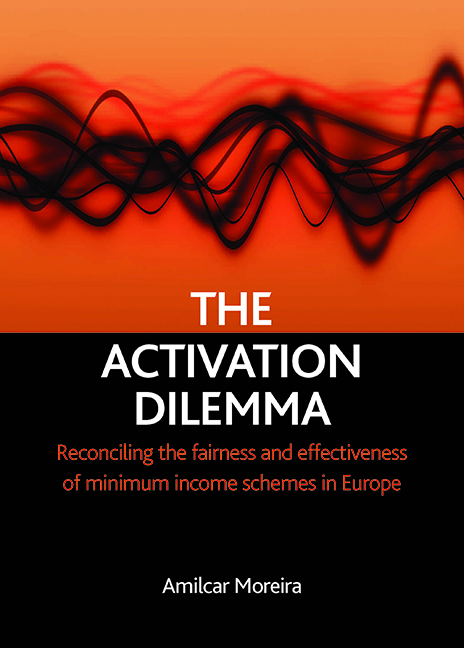 The Activation Dilemma
The Activation Dilemma Book contents
- Frontmatter
- Dedication
- Contents
- List of tables and figures
- List of abbreviations
- Acknowledgements
- one Introduction
- two The right to a minimum income: between Mead and Van Parijs
- three Justifying a minimum income guarantee: the right to personal development
- four The activation dilemma: a comparative study
- five Measuring respect for the right to personal development
- six The employment effectiveness of minimum income schemes
- seven The employment effectiveness of minimum income schemes and their respect for the right to personal development
- eight Conclusion
- Appendix A Methodology for benefit comparison
- Appendix B Unemployment reintegration capacity (URC): sensitivity analysis
- Appendix C Qualitative comparative analysis: laws of Boolean algebra
- References
- Index
- Also available from The Policy Press
four - The activation dilemma: a comparative study
Published online by Cambridge University Press: 21 January 2022
- Frontmatter
- Dedication
- Contents
- List of tables and figures
- List of abbreviations
- Acknowledgements
- one Introduction
- two The right to a minimum income: between Mead and Van Parijs
- three Justifying a minimum income guarantee: the right to personal development
- four The activation dilemma: a comparative study
- five Measuring respect for the right to personal development
- six The employment effectiveness of minimum income schemes
- seven The employment effectiveness of minimum income schemes and their respect for the right to personal development
- eight Conclusion
- Appendix A Methodology for benefit comparison
- Appendix B Unemployment reintegration capacity (URC): sensitivity analysis
- Appendix C Qualitative comparative analysis: laws of Boolean algebra
- References
- Index
- Also available from The Policy Press
Summary
As seen in previous chapters, besides the discussion about the terms in which the right to a minimum income can be justified, the introduction of activation requirements in minimum income schemes has prompted a debate about how schemes should balance the need to help recipients to (re)gain their self-sufficiency through paid work, with the respect of their rights (see Chapter One). Having demonstrated that the right to personal development can provide adequate justification for the right to a minimum income, this normative framework will serve as the standpoint from which to analyse the balance between fairness and effectiveness in the activation of minimum income recipients.
As mentioned in Chapter Two, Mead seems to argue that the employment effectiveness of minimum income schemes is more dependent on their ability to enforce recipients’ obligation to work than on the opportunities available to them (1986, pp 156-68). The argument that will be put forward here is quite distinct from this. As seen earlier (Chapter Three), underlying the right to personal development is a preoccupation with balancing individuals’ rights and responsibilities, the main assumption being that this combination of positive and negative incentives to recipients will act in such a way as to increase the employment effectiveness of minimum income schemes.
There are reasons to believe that investment in active labour market policy (ALMP) would improve the employment prospects of minimum income recipients. For instance, various studies have suggested that direct job creation schemes can effectively improve the employment prospects of participants (see Breen, 1991; De Koning et al, 1994; Lechner et al, 1996). Also, as Meager and Evans suggest (1997, p 59), despite having significant displacement and substitution effects (see Breen and Halpin, 1989; De Koning, 1993), subsidies to employers do create more employment opportunities for hard-to-employ individuals, typical of minimum income schemes. Finally, the existing evidence suggests that in-work benefits such as tax credits (see Hotz et al, 2005 or McKay, 2003, pp 31-3) or earnings supplements (see Gardiner, 1997; Bloom and Michalopoulos, 2001) seem to be very effective at inducing minimum income recipients to take up jobs. In light of this, it can be hypothesised that schemes that create more opportunities for recipients to find work, namely via investment in ALMPs, will be more effective at returning beneficiaries back to the labour market.
- Type
- Chapter
- Information
- The Activation DilemmaReconciling the Fairness and Effectiveness of Minimum Income Schemes in Europe, pp. 49 - 64Publisher: Bristol University PressPrint publication year: 2008


